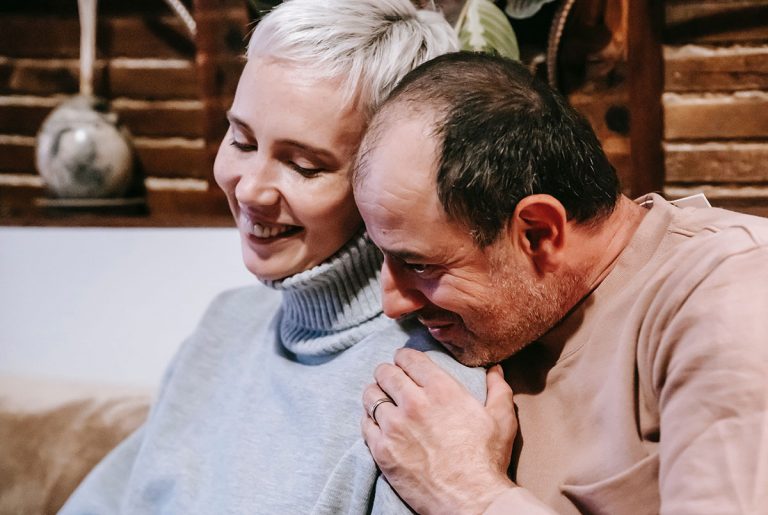Good communication is the foundation for a good relationship. The words you share really do matter. But how you share those words is perhaps even more important than the words themselves. We take a look at the important differences between ‘I’ statements and ‘you’ statements, and how you can use them to have better discussions with your partner.
When you’re having a difficult conversation with your partner, accusatory tones and words can stop a discussion dead in its tracks. As soon as one or both of you feel attacked, the defensive walls come up, and constructive communication becomes all but impossible.
While we may know this instinctively, many of us frequently use statements that imply that the other person has intentionally hurt us and is wholly to blame in a situation. We focus on the other person’s behaviour or actions first, without spending time thinking about and articulating why we’re feeling hurt.
Herein lies the difference between ‘I’ and ‘you’ statements.
It’s a simple switch, but by being a little more mindful of how you voice your concerns when you communicate with your partner, you can have a huge positive impact on how much they are able to listen and hear what you’re trying to say.
Examples of ‘I’ statements and ‘you’ statements
Here are some specific ways that ‘I’ and ‘You’ statements are used in our everyday lives.
‘You’ statements:
- “You always leave your mess lying everywhere.”
- “You don’t care about me or my feelings.”
- “You didn’t text me like you said you would.”
- “You embarrassed me at dinner the other night, like you always do.”
- “You never tell me how you’re feeling.”
‘I’ statements:
- “I feel frustrated when I come home and the house is messy.”
- “I feel frustrated when my feelings aren’t heard or acknowledged.”
- “I feel worried when I don’t hear from you, and I just want to know that you’re ok and safe.”
- “I felt really embarrassed the other night in front of our friends when this topic came up, because…”
- “I would love to know how you’re feeling about this.”
Why should we start our sentences with ‘I’?
Starting a sentence with ‘I’ helps us talk about difficult feelings, say how the problem is affecting us and stops other people feeling blamed. It forces us to take responsibility for our own thoughts and feelings. Partners tend to experience this as less hostile, opening the possibility of further conversation and hope for a resolution.
Ultimately, they can frame a situation as something to be workshopped and solved together, instead of sounding like a complaint about your partner, or an attack on their character.
This short video explains why almost all of us defensive when faced with a perceived attack or criticism.
Practise using ‘I’ statements
Modelling a new way of communication takes time, practice and repetition. If you find yourself struggling to remember to use ‘I’ statements in real-time when you’re in the middle of a conflict or heated conversation, try one of the following practice exercises to help you form new habits around how you speak to your partner:
- For 3-5 minutes, talk about a topic you really love, starting every sentence with an ‘I’ statement. You can do this with a friend, partner, family member or just give it a go it in front of the mirror.
- For 10 minutes, during a conversation with your partner, family or friend, try and start every sentence with ‘I….’. Let others present know you are practising this and ask them if they’d also like to give it a go. Avoid using ‘you’ as much as possible when speaking. If you feel like you do need to say ‘you’ or catch yourself using ‘you’, try substituting ‘I’ and see if it will work and still makes sense.
Even if the above practice exercises feel silly at first, just roll with it. Using some humour may even help you out the next time you’re looking to discuss something important with your partner.
Good communication is a habit
Communicating effectively isn’t just a skill you’re born with. It can be learned, and with a little repetition and practice, things will get easier.
If you feel like you need a little more support with your communication skills, especially with your partner, there is help available. Relationships Australia NSW offers Couples’ Communication Group Workshops throughout the year, to help you learn the skills to talk through issues with your partner more effectively.
Related Services & Workshops

Counselling.Couples.Mental Health.LGBTQIA+
Couples Counselling
Relationships can be tough, and sometimes we all need some extra support and guidance to help us move forward. Couples Counselling at RANSW offers a supportive environment where you can discuss concerns, overcome tensions and strengthen your partnership.

Group Workshops.Couples.Communication
Couples’ Communication
A group workshop for couples who want to develop new and effective ways of communicating with each other. Learn tools and gain new skills to deal with challenges and strengthen relationships.

Online Courses.Couples.Conflict
Couple Connect
In relationships, communication is key. This online course helps you develop skills to repair, strengthen, and improve your relationship, using common scenarios and tailored activities.





